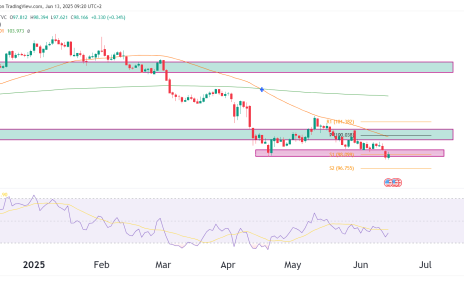- Gold prices hit a record high of over $3,300 on Wednesday.
- Trump is considering new tariffs on critical mineral imports, targeting China.
- Market participants are expecting the US retail sales report.
Gold prices hit a record high of over $3,300 on Wednesday amid growing trade tensions between China and the US. Investors continued buying the safe-haven metal to protect against the risk of a US recession. Meanwhile, recent US inflation data piled pressure on the Fed to lower borrowing costs, further supporting gold prices.
Spot gold (Source: Bloomberg)
Gold has continued making record highs this year due to uncertainty surrounding Trump’s tariff campaign. This uncertainty increased last week after the US president imposed the suspended reciprocal tariffs on many countries. The move caused most to believe the administration was unstable, and therefore, the economy would reflect this instability.
As a result, there was a significant shift from US assets to safe-haven assets like gold. At the same time, other investors preferred the European markets. Moreover, the trade war between China and the US escalated as Trump kept hiking tariffs on Chinese goods.
By Wednesday, the US was considering new tariffs on critical mineral imports, targeting China. Additionally, new tariffs might be imposed on tech chips and pharmaceuticals. This is a sign that neither the US nor China is ready to relent and agree to better trading deals. Therefore, the trade war will rage on, and its impacts will start showing in economic data.
Data last week revealed that US consumer inflation fell in March. Wholesale inflation also significantly dropped during the month. The report increased expectations for Fed rate cuts. Lower borrowing costs favor the non-yielding gold.
However, policymakers have remained cautious, emphasizing the need for patience. According to Powell, the Fed needs more time to assess the impact of Trump’s tariffs. Meanwhile, Christopher Waller said a recession would force the central bank to lower borrowing costs even if inflation is high.
Tariffs tend to drive up the cost of goods, putting upward pressure on inflation. However, the resulting trade wars end up hurting the economy. Data on Friday revealed a sharp decline in consumer sentiment due to the recent tariff developments. On the other hand, inflation expectations soared.
Market participants are now expecting the US retail sales report. It will show the state of consumer spending, guiding the outlook for Fed rate cuts. Additionally, they will watch a speech from Fed Chair Powell.


